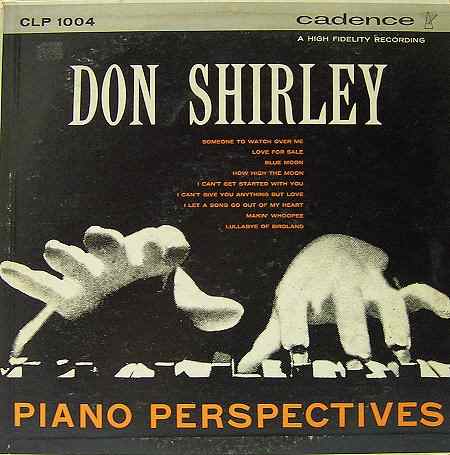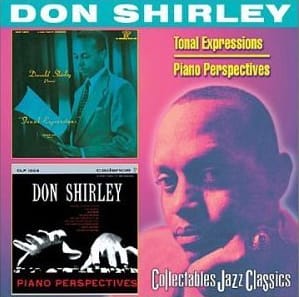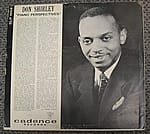|
|
|
|
HOME | About this Page | Your Comments | Contact |

|
|
|
|
|
||||
To be commercial, to be accepted as a "selling artist" is to be desired most naturally. Often it is done by forfeiting ones standards to make the mass appeal. It is gratifying to note that the phenomenal sale of the first album was made with no concession to standards as envisioned by Don. I had the happy experience of broadcasting the abum [sic] in its premiere performance and the response from the first playing was signal enough to me to be confident of Don Shirley's success. In subsequent night club appearances, not only in the New York area but also out of town, audiences were delighted with the approach Don Shirley has to contemporary music. Don's music is singular but at the same time controversial. Invariably people tend to classify, that is, what school of piano or what style . . .and more popularly, is it jazz or classical. You could say all of these things about Don Shirley and be right. You could also be wrong. Where you classify someone [sic] is not always a matter of fact but largely a matter of personal taste. Don Shirley runs the well known gamut of technique classical and jazz. His approach is both warm and human, yet the brilliant touch he employs propels his music away from the personal and into a much more dynamic and thereby lasting effect. All of this I may have in my first set of notes and perhaps in more articulate form, but I might here be probing a little further into the kind of pianist Don Shirley is and the center is least definitive. Perhaps a word or
two regarding Don's extra activities might lend some stature
to this artist. Duke Ellington recently gave a concert at
Carnegie Hall. He wrote a piano concerto for Don to perform.
Don's performance of this concerto with the N.B.C. Symphony
of the Air was the high spot of the program. During the
winter season he made several television appearances, the
most interesting being "The Arthur Godfrey Show". Mr.
Godfrey was most kind to him. And it was his enthusiasm for
Don that got listener-viewers excited about him too.
Favorable reviews in the music journals enabled Don to climb
another notch but the one really big literary booster was
Esquire whose column length editorial on the artistry of
Don All of the tunes in this volume are standards--that is, established old favorites. As you can appreciate, they offer a challenge to the artist and his sense of invention. To make tunes like "Blue Moon", "I Can't Get Started with You", and "I Let A Song Go Out of My Heart" sound like they were never played before is quite a problem for any musician. In these three tunes especially, Don achieves a quiet sound that is as individual and personal to him as the elongated face and neck is to a Modigliani and equally as graceful. Describe it any way you wish: quiet sound, embroidery with fine needle, delicate etching, or make something up yourself. I'm sure you will get the same message. Listen to "Blue Moon" and you can feel the aloneness, the blue quiet, the tranquility. In "Someone to Watch Over Me" which is taken at a very slow-moving tempo, Don Shirley utilizes his knowledge of harmonics and overtones with a delicate counterpoint. As in other selections, Richard Davis compliments Don's playing. "Love For Sale" is a splendid example of Don Shirley's forceful playing. His ability to concertize and swing simultaneously is well worth listening to. The introduction to the second chorus features Don playing a metronome-like series of single notes to build up the rhythm pattern which is quite effective. I also had the feeling during "Love For Sale" that a slight tribute to Erroll Garner was insinuated. "I Can't Give You Anything But love" and "Makin' Whoopee" are taken at what is generally accepted to be head-shakin' tempo. "Lullaby of Birdland" might well have been titled "Lullaby of Carnegie Hall" because while the melody is preserved, there are certain long haired accoutrements that you would never find at Broadway and Fifty-Second Street. (Unless of course, Don Shirley was playing Birdland.) Extremely refreshing! It must be a great challenge to the modern pianist to come up with a new concept of a tune like "How High the Moon" that is constantly being extemporized upon. The chords and changes in the introduction are full and beautiful, and unfold a grace and charm to this song that I never knew existed before. However, the introduction is merely a set-up because whatever stops a piano has have all been pulled out by Don Shirley in this selection. Everything from the classical jazz approach to a Mozart minuet style, the rondo, and a tremendous bass chorus by Richard Davis, who shows extremely fine taste, shows up in this arrangement. In conclusion, I feel that this album is just as deserving of praise as the first one and shows Don Shirley to advantage as a pianist. A lot less people will be asking who Don Shirley is after the release of this album. Al "Jazzbo" Collins |
|||||||




